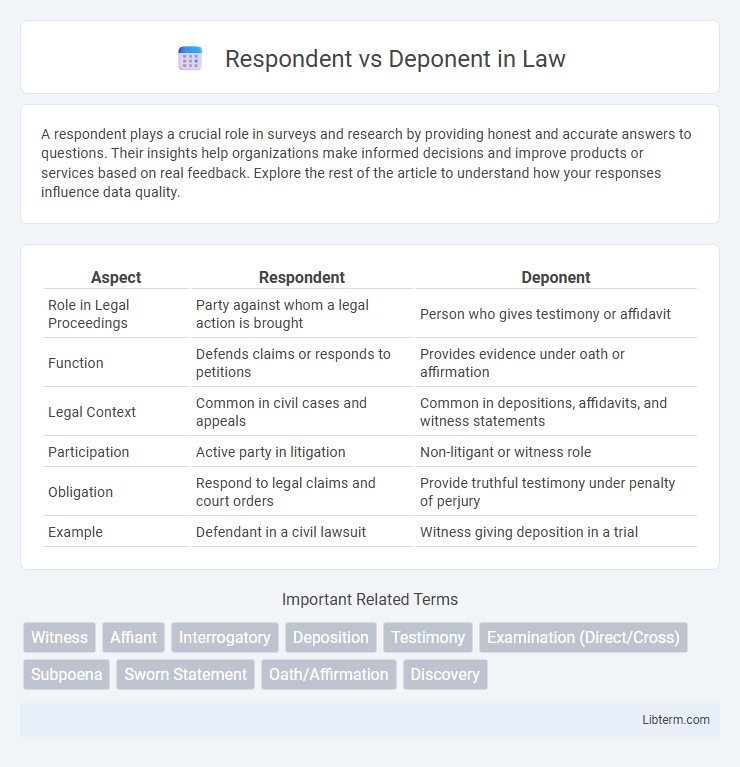A respondent plays a crucial role in surveys and research by providing honest and accurate answers to questions. Their insights help organizations make informed decisions and improve products or services based on real feedback. Explore the rest of the article to understand how your responses influence data quality.
Table of Comparison
| Aspect | Respondent | Deponent |
|---|---|---|
| Role in Legal Proceedings | Party against whom a legal action is brought | Person who gives testimony or affidavit |
| Function | Defends claims or responds to petitions | Provides evidence under oath or affirmation |
| Legal Context | Common in civil cases and appeals | Common in depositions, affidavits, and witness statements |
| Participation | Active party in litigation | Non-litigant or witness role |
| Obligation | Respond to legal claims and court orders | Provide truthful testimony under penalty of perjury |
| Example | Defendant in a civil lawsuit | Witness giving deposition in a trial |
Understanding the Terms: Respondent and Deponent
The respondent is the party who answers or responds to a petition or legal action, typically in civil cases or appeals. In contrast, the deponent is an individual who provides sworn testimony or deposition outside the courtroom, often during the discovery phase of litigation. Understanding that respondents engage in legal proceedings by defending or opposing claims, while deponents contribute factual evidence through recorded statements, clarifies their distinct roles in legal processes.
Legal Contexts: Where Each Term is Used
In legal contexts, the term "respondent" is primarily used in civil cases, appeals, and administrative hearings to denote the party responding to a petition or appeal, often the defendant or opposing party. "Deponent" refers specifically to a person who gives sworn testimony or deposition outside of court, serving as a witness whose statements are recorded for later use in trial. These distinctions highlight that "respondent" indicates a role in the litigation process, while "deponent" emphasizes the mode of providing sworn evidence.
Definition of a Respondent
A respondent is a party who answers or responds to a legal petition, complaint, or inquiry, typically in civil or administrative proceedings. Unlike a deponent, who provides sworn testimony or deposition, the respondent's role is to address allegations or claims made against them. Understanding the respondent's responsibilities is essential in legal contexts where their reply influences case outcomes.
Definition of a Deponent
A deponent is an individual who provides sworn testimony or deposition outside the courtroom, often in written or recorded form, under oath. Unlike a respondent, who is typically the party answering a claim in legal proceedings, the deponent's role is primarily to supply factual information relevant to the case. Deponents are crucial for gathering evidence through recorded statements before trial to establish facts and assist in case preparation.
Core Differences Between Respondent and Deponent
The core difference between a respondent and a deponent lies in their roles within legal proceedings: a respondent is the party against whom a petition or appeal is filed, responsible for answering or defending against claims, while a deponent is an individual who provides testimony or evidence under oath, often through affidavit or deposition. Respondents actively participate as litigants, whereas deponents serve as witnesses supplying factual information. This distinction is critical in civil and criminal procedures, affecting the nature of involvement and legal obligations each party holds.
Roles in Legal Proceedings
The respondent is the party who answers or defends against a claim in legal proceedings, often in appellate or family law cases. The deponent refers to a witness who provides sworn testimony outside of court during the discovery phase through a deposition. Understanding these roles is crucial for navigating procedural aspects and effectively presenting evidence in litigation.
Responsibilities of a Respondent
The respondent in legal proceedings holds the responsibility to answer allegations raised by the petitioner, presenting evidence and arguments to counter claims effectively. They must comply with procedural requirements such as submitting timely pleadings, attending hearings, and providing truthful testimony under oath. Ensuring responsiveness and cooperation throughout the litigation process is essential for a respondent to uphold their legal rights and obligations.
Duties and Rights of a Deponent
A deponent has the duty to provide truthful, clear, and complete testimony under oath during legal proceedings, ensuring accuracy and honesty in their statements. They hold the right to be informed of the questions posed, seek legal counsel before answering, and refuse to answer if a question infringes on privilege or self-incrimination protections. The deponent's obligation to cooperate with the court is balanced by protections against coercion and maintaining confidentiality where legally applicable.
Impact on Case Outcomes
The roles of respondent and deponent distinctly impact case outcomes by shaping the scope of testimony and evidence presented. A respondent directly addresses claims or allegations, influencing verdicts through their responses and defenses, while a deponent provides sworn testimony that can corroborate or undermine case narratives. Differentiating these roles ensures clarity in legal strategies, affecting the credibility and evidentiary weight that ultimately sway judicial decisions.
Choosing the Correct Term in Legal Documents
Choosing the correct term between "Respondent" and "Deponent" in legal documents is essential for clarity and procedural accuracy. A Respondent refers to the party against whom a petition or appeal is filed, typically in civil or family law cases, whereas a Deponent is a person who provides sworn testimony during a deposition. Properly distinguishing these roles ensures precise legal interpretation and effective case management.
Respondent Infographic

 libterm.com
libterm.com